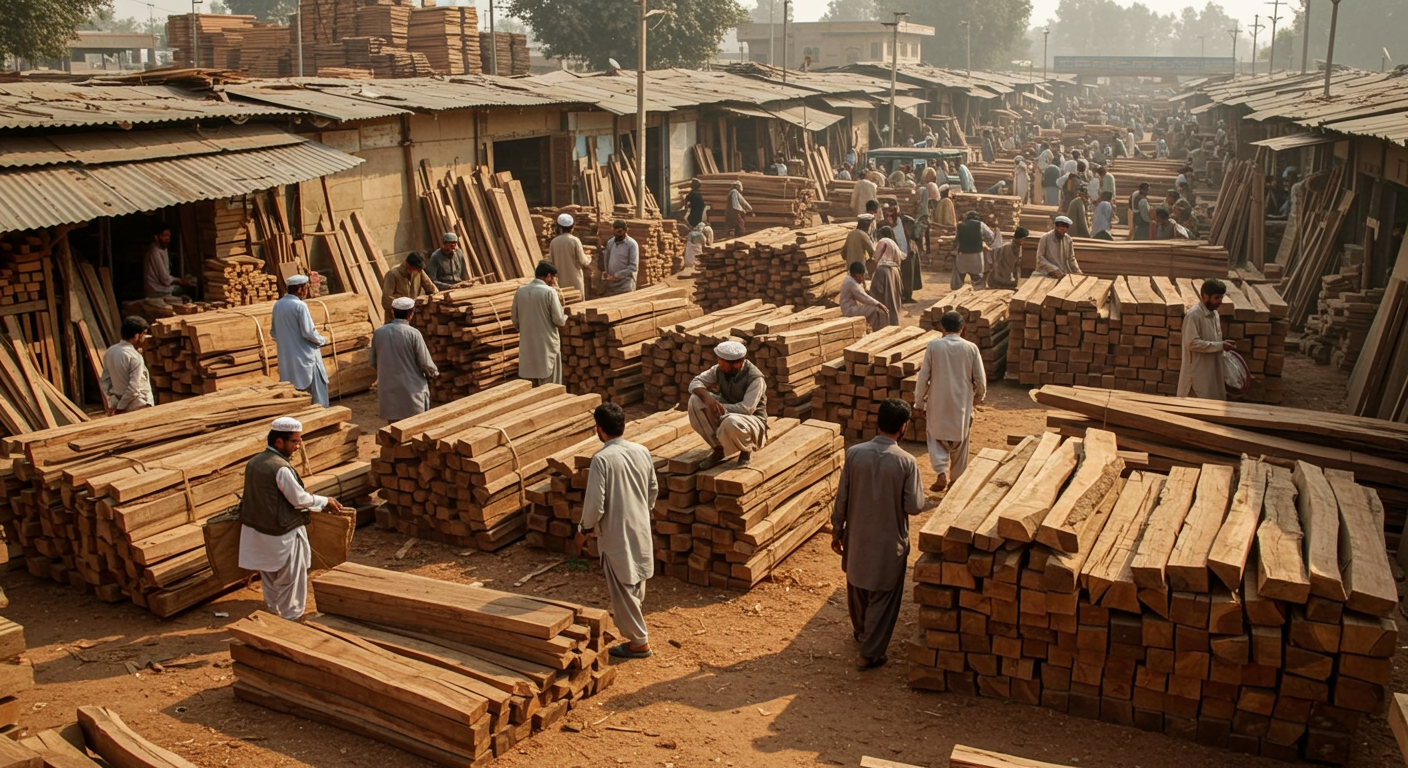Wood Prices Rise Sharply in Multan’s Timber Market: Construction and Furniture Costs Affected

Multan – June 2025:
People involved in the construction and furniture business in Multan are facing serious problems as wood prices have seen a sharp increase in the city’s main timber market. The sudden rise in wood prices has worried builders, carpenters, vendors, and everyday customers planning construction or furniture projects.
High Demand, Low Supply Behind Price Surge
According to traders in the Multan wood market, the main reason behind the rising prices is the gap between supply and demand. Due to a variety of factors — including reduced imports, increased transportation costs, and slow local production — the supply of wood has gone down. Meanwhile, demand has risen due to ongoing housing and furniture projects across the region.
“We are receiving fewer supplies from upcountry and even from local forests,” said Gulzar Ahmed, a long-time timber trader in Multan. “Transport is expensive, and imported wood has become costlier due to the rising dollar rate and custom duties.”
He added that local wood sources are unable to meet market demand, especially for high-quality varieties like sheesham (rosewood), kail, and deodar, which are widely used for making furniture and home decor.
Impact on Construction and Furniture Industries
The increase in wood prices is creating trouble for those building homes or making furniture. In particular, carpenters and small furniture workshops are being hit hard.
“I had to turn down three orders last week because I couldn’t afford to buy the wood,” said Fazal Rehman, a carpenter who runs a small workshop in the city. “Even basic wood planks have become so costly that it’s difficult to maintain profits.”
Builders say that the overall cost of constructing houses has increased due to expensive wood, which is used in doors, windows, ceilings, and other essential parts of homes. Customers are now being asked to pay more or compromise on quality.
Furniture Market Slows Down
Multan’s handcrafted furniture industry plays a vital role in supporting the livelihoods of numerous local families. However, with wood prices going up, many furniture makers are losing customers who cannot afford higher prices.
Saeed Furniture House, a popular store in the Ghanta Ghar area, reported a drop in sales over the past two months. “Earlier, people were buying full bedroom sets. Now they ask for only one or two items or postpone their orders,” said the store manager.
Retail Price Comparison
Here’s a quick look at how much prices have changed in the past few months:
| Wood Type | Old Price (per cft) | New Price (per cft) |
|---|---|---|
| Sheesham | Rs. 3,200 | Rs. 4,000 |
| Kail | Rs. 2,600 | Rs. 3,200 |
| Deodar | Rs. 3,500 | Rs. 4,300 |
| Partal (Pine) | Rs. 1,800 | Rs. 2,300 |
Traders warn that prices may increase further if no action is taken by authorities.
Transport Costs Add to the Problem
One of the major reasons for this price increase is the high cost of transporting wood. Fuel prices have gone up significantly in recent months, which has made it more expensive to bring wood from other cities or regions. Additionally, delays at check posts and toll taxes have further increased delivery times and costs.
“Even if we find cheaper wood from other regions, the transport charges make it equally expensive,” said Bashir Khan, a timber supplier in Multan.
Climate Change and Deforestation Affecting Supply
Experts also believe that climate change and deforestation are long-term issues affecting wood availability in Pakistan. Overcutting of trees, lack of replantation, and changing weather patterns have reduced forest cover, limiting the supply of high-quality wood.
Dr. Shahnaz Awan, a forestry expert, stated, “We need better forest management and sustainable harvesting methods. Without this, wood prices will keep rising and the furniture industry may collapse in the future.”
What Can Be Done?
Their demands include:
- Reducing import duties on wood from other countries
- Subsidizing transport costs for timber traders
- Strict action against illegal wood hoarding
- Promotion of alternative materials like MDF or engineered wood
- Tree planting campaigns to increase future supply
Citizens Feel the Pressure
The rising wood prices are not just affecting businesses but also the average citizen. People planning to build homes, repair furniture, or get new wardrobes made are all feeling the financial burden.
“I was planning to get new kitchen cabinets installed,” said Rubina Bibi, a resident of Gulgasht Colony. “But after hearing the new rates, I’ve decided to wait. It’s just too expensive now.”
Conclusion
The increase in wood prices in Multan’s timber market is becoming a serious issue that requires attention from both the government and industry stakeholders. From construction and furniture to everyday home repairs, the high cost of wood is affecting lives in many ways. If timely action is not taken, this could lead to a slowdown in one of the region’s most important sectors.

